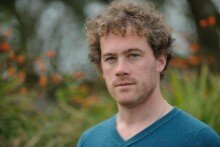
Simon Ó Faoláin was born in Dublin and raised in west Kerry. He trained as an archaeologist and has worked both in the private sector and as an academic, authoring and co-authoring several books on archaeology and Celtic Studies. He won the Colm Cille Prize in the years 2008 and 2010. His first collection, Anam Mhadra (A Dog's Soul), was published by Coiscéim in 2008, and won both the Glen Dimplex Irish Award and the Eithne and Rupert Strong Award. His first play, An Poll (The Hole), won the Walter Macken Prize from An Taibhdhearc in 2010. His second collection of poetry, As Gaineamh (From Sand), was published in 2011.
The Dingle peninsula in west Kerry, the most southwesterly corner of Ireland’s most southwesterly county, has long held a prominent place in Irish letters. In the last sixty years some of Irish-language poetry’s most esteemed practitioners – Nuala Ní Dhomhnaill, Máire Mhac an tSaoi, and Seán Ó Ríordáin, for example – have rediscovered their roots and perfected their art in the area. This has ensured the modernity of their poetry, allowing them to craft work based both on a solid vernacular and a uniquely assured and continuous literary heritage. Simon Ó Faoláin, born in Dublin but raised in the peninsula and its surroundings, is the latest poet in this long tradition.
Ó Faoláin was born in 1973 and trained as an archaeologist at the universities of Galway and Aberystwyth, Wales. He is a licensed excavator and has published academic books and articles in the fields of Celtic metallurgy and archaeological mapping. Yet it is as a poet that he is increasingly known – and acclaimed. Ó Faoláin’s first collection Anam Mhadra was published by Coiscéim in 2008, and introduced a new and strangely assured voice; a mind devoted to poetry, unafraid of both formal learning and experimentation. Its achievement was recognised when Ó Faoláin won both the Glen Dimplex and the Strong awards for best first collection, despite the difficulty of achieving a level playing field for untranslated work in Irish, by far the smaller of Ireland’s two official languages.
Ó Faoláin's second collection, As Gaineamh, sees his profession of archaeologist and status as father fuse with his vocation as poet in an ancient and – seemingly – dying language. The book sees his language increase in sinewy strength and the widening of his intellectual, cultural and social reference points: no other poet could compare the small irregular hillside fields with cancerous cells on a screen.
As Gaineamh reveals a view of time that is both postmodern and traditionally Celtic. In a poem about the excavation of a Viking ship, prefaced by a quotation in French from Samuel Beckett, Ó Faoláin writes Triallfam amárach ar inné arís or ‘tomorrow we will again go to yesterday’. Irish poetry is fortunate that it has, in Ó Faoláin, a practitioner with the rigorous intellectual honesty necessary to both probe its past and point the way to its future.
Bibliography
Anam Mhadra, Coiscéim, Dublin, 2008
As Gaineamh, Coiscéim, Dublin, 2011

